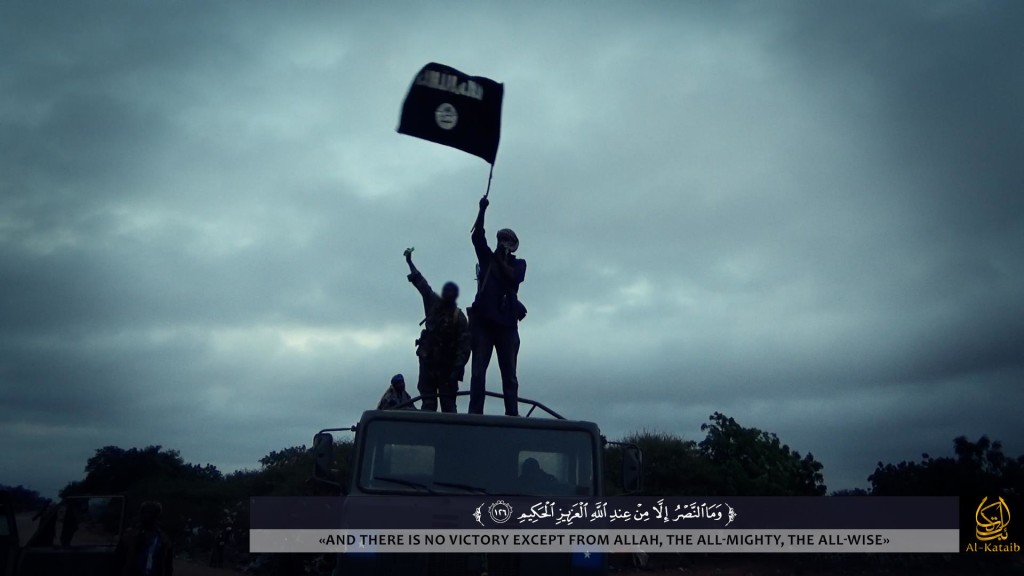Shabaab fighters raise the group’s flag after overrunning a Somali military base in September
Shabaab, al Qaeda’s official branch in Somalia, attacked the Al Sahafi hotel in Somalia’s capital Mogadishu. The attack, which began with two vehicle-borne improvised explosive devices (VBIED’s, or car bombs) before an assault team entered the breached perimeter, has left at least 15 dead.
According to the BBC, victims of the assault include at least one Somali MP, the owner of the hotel, and a Somali general. After breaching the perimeter, the jihadists moved in took control of the hotel, according to Reuters. However, the BBC quotes Somali government and African Union officials who said that government troops have regained control over the hotel “after a fierce gun battle.” African Union troops also a played a role in clearing the building.
In a statement released online, Shabaab said its “Sheikh Abu Musab al Zarqawi Martyrdom Brigade targeted the leadership of the apostate regime who sought sanctuary in the hotel after having fled all other hotels in Mogadishu for fear of attacks.” It goes on to say that in the hotel, “the apostates and their Western advisers plotted and planned against the Muslims in Somalia.” Additionally, the jihadist group says that the attack shows that “no barriers, however seemingly impenetrable, can obstruct the forces of Tawhid [monotheism] and the Mujahideen will, by the permission of Allah, get to them despite barricades and stringent security measures.”
Shabaab routinely targets hotels in the Somali capital, as these are often meeting places for government officials and foreigners. On March 27, the jihadist group stormed a hotel and briefly seized control of it before the attackers were killed by security forces. On Feb. 20, a suicide assault team hit the Central Hotel, a gathering place for Somali parliamentarians and other members of government, killing several senior Somali politicians. On Jan. 22, Shabaab claimed credit for the bombing at the SYL Hotel in Mogadishu that killed three people. The attack took place as Turkish President Recep Tayyip Erdogan and a delegation were at the hotel.
In July, Shabaab killed more than 10 people after storming the Jazeera Hotel. This was not the first time the hotel was targeted by the jihadist group. In early 2014, Shabaab launched a complex assault on the hotel, exploding three bombs within an hour of each other and killing 11 people. The first bomb was deployed by a suicide bomber who drove into the gate of the hotel, killing himself and four other people, while the second was a car bomb that detonated as first responders rushed to the scene. The third bomb exploded approximately one hour later in a car being searched by the military. [See LWJ reports, Shabaab targets Jazeera hotel in Mogadishu, 2nd Shabaab attack on Mogadishu’s Jazeera hotel.]
In September 2012, the group also sent three suicide bombers to attack Somalia’s new president and Kenya’s foreign minister as they were speaking at the hotel. The two officials escaped unhurt, but at least seven people were killed.
The suicide assault, or coordinated attack using one or more suicide bombers and sometimes a follow-on assault team, is a tactic frequently used by Al Qaeda and its branches, as well as allied groups such as the Afghan Taliban, the Movement of the Taliban in Pakistan, Lashkar-e-Taiba, and the Islamic Movement of Uzbekistan. The Islamic State also often employs this tactic. Suicide assaults are commonly executed by jihadist groups in Iraq, Syria, Yemen, Afghanistan, Pakistan, Somalia, and Nigeria.








